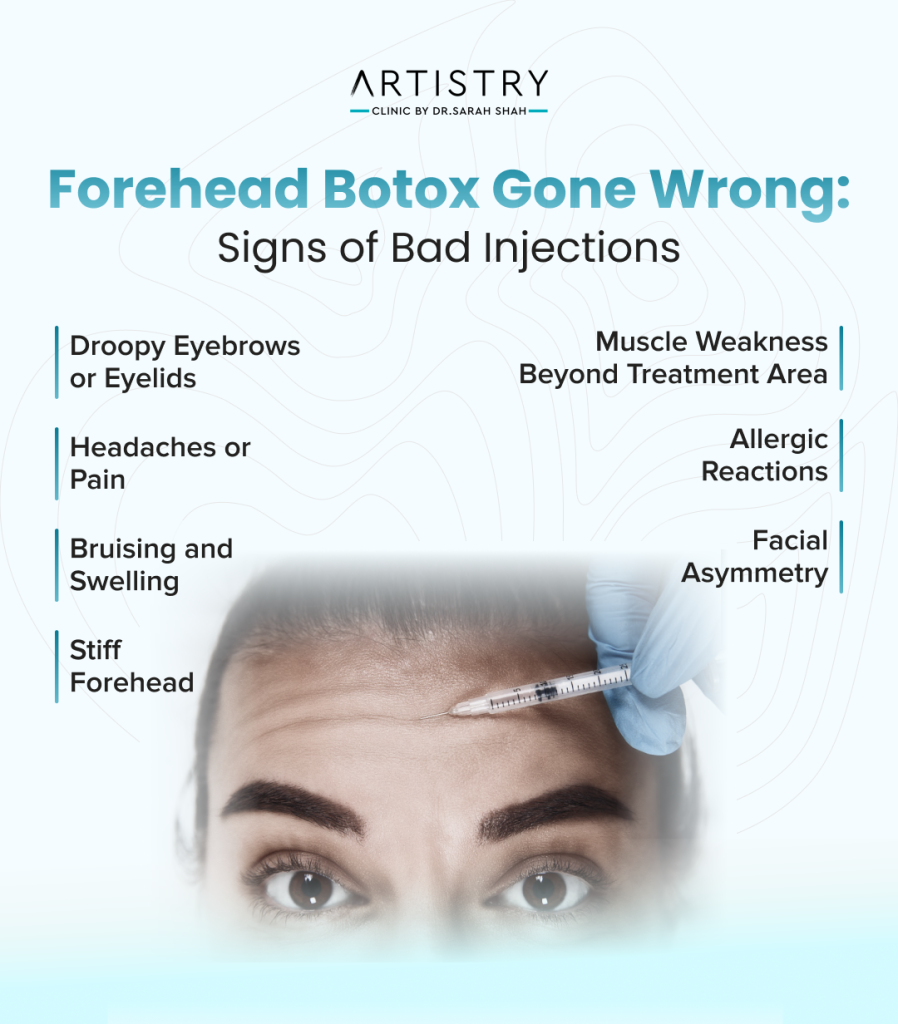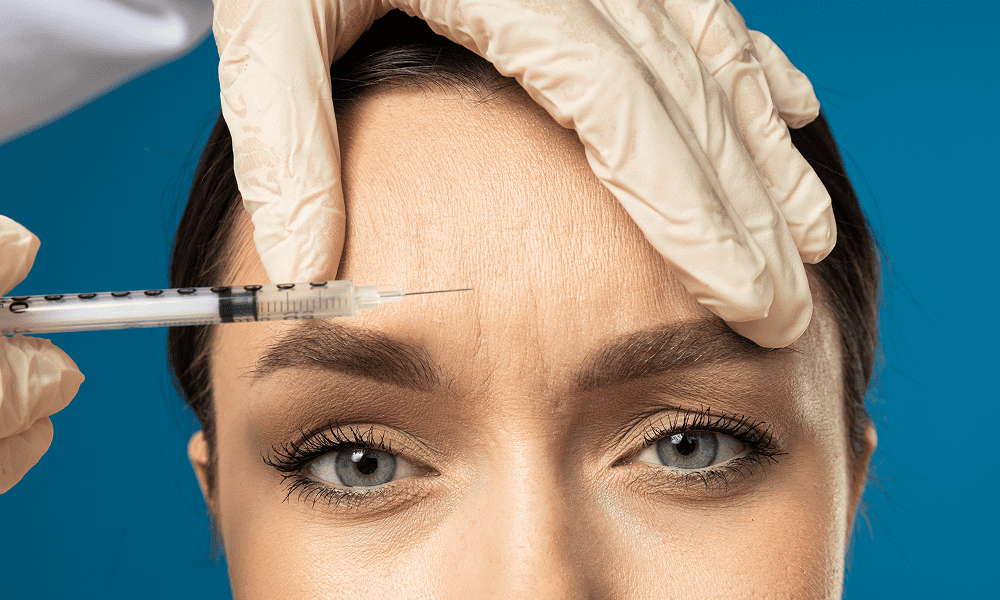Botox has become one of the most popular cosmetic treatments, especially for smoothing forehead wrinkles. It offers a quick way to achieve a youthful, fresh look with minimal downtime. However, while Botox is generally safe, things can sometimes go wrong, especially when the procedure is not done correctly.
If you or someone you know has experienced issues after forehead Botox, it’s important to understand what can cause these problems, how to recognise them, and what to do next. This article will explain everything you need to know about forehead Botox gone wrong.
What is Forehead Botox?
Botox is a purified protein that temporarily relaxes muscles by blocking nerve signals. When injected into the forehead muscles, it softens wrinkles and lines caused by facial expressions like frowning or raising eyebrows.
Most people get Botox to look younger or to prevent wrinkles from forming. The treatment takes about 10 to 15 minutes, and results usually last 3 to 4 months.
Signs of Forehead Botox Going Wrong

Though Botox is safe when done by a skilled professional, mistakes can happen. Here are some of the most common issues people face after forehead Botox:
1. Droopy Eyebrows or Eyelids (Ptosis)
One of the most common side effects is drooping of the eyelids or eyebrows. This happens when Botox spreads to muscles it wasn’t meant to affect. If the muscles responsible for lifting the eyelid get weakened, the eyelid may droop and cover part of the eye.
2. Headaches or Pain
Some people experience headaches or mild pain after Botox injections. This usually happens when the injections irritate nerves or muscles in the forehead. These symptoms are typically temporary but can be uncomfortable.
3. Allergic Reactions
Though rare, allergic reactions to Botox can occur. Symptoms might include itching, swelling, redness, or difficulty breathing. Immediate medical attention is needed if any signs of allergy appear.
4. Bruising and Swelling
Bruising or swelling at the injection areas is common but should fade within a few days. Excessive bruising may suggest incorrect injection technique or patient sensitivity.
5. Muscle Weakness Beyond Treatment Area
Sometimes Botox can spread beyond the targeted area, causing muscle weakness in surrounding areas like the temples or around the eyes.
6. Facial Asymmetry
Facial asymmetry happens when Botox affects one side of the forehead more than the other. This may lead to one eyebrow being higher or more mobile than the other, or one side of the forehead looking flatter. In severe cases, it can make expressions look off-balance or uneven.
7. Stiff Forehead
Overuse or poor injection placement can lead to a stiff forehead, where natural movement is limited. This can make it hard to raise your eyebrows or show expressions, making the face appear overly frozen or unnatural. A stiff forehead often resolves as the Botox wears off, but it can be frustrating in the meantime.
Why Do These Problems Happen?
Understanding the reasons behind forehead Botox gone wrong is important to prevent future issues.
1. Untrained or Inexperienced Injector
Botox injections require precise knowledge of facial anatomy. An inexperienced injector may place the toxin in the wrong muscle or use an incorrect dose.
2. Improper Dosage
Too much Botox can cause excessive muscle paralysis, leading to unnatural expressions or drooping. Too little may not produce the desired effect.
3. Poor Injection Technique
An incorrect angle or depth of the needle can affect where the Botox goes and how it acts on the muscles.
4. Patient Factors
Individual anatomy varies widely. Factors like muscle strength, skin thickness, and previous Botox treatments can affect results.
5. Low-Quality Product or Dilution
Using low-quality or improperly stored Botox can lead to poor results. In some cases, Botox may be overly diluted with saline, reducing its effectiveness or causing it to spread too far. Only trusted, medical-grade products should be used, and they should be handled under proper clinical standards.
6. Not Following Aftercare Instructions
Rubbing the treated area, lying down immediately after treatment, or strenuous exercise can cause Botox to migrate from the injection site.
How to Avoid Forehead Botox Complications?
If you want to avoid forehead Botox gone wrong, here are some key tips:
1. Choose a Qualified Injector: Make sure your injector is licensed, experienced, and specialises in facial aesthetics. Check reviews and ask to see before-and-after photos.
2. Have a Detailed Consultation: Discuss your goals, medical history, and any concerns. A skilled injector will assess your facial muscles and design a personalised treatment plan.
3. Follow Pre-Treatment Instructions: Avoid blood-thinning medications like aspirin or alcohol for a few days before treatment to reduce bruising.
4. Follow Post-Treatment Care:
- Avoid rubbing the area for 24 hours.
- Keep upright for at least 4 hours.
- Avoid heavy exercise or sauna for 24 hours.
- Skip alcohol on the day of treatment.
What to Do If Forehead Botox Goes Wrong?
If you notice Botox on forehead gone wrong, here are some steps you can take:
1. Contact Your Injector Immediately
Contact your doctor right away if you notice any side effects. This is especially important if you notice drooping eyelids, severe pain, or signs of an allergic reaction.
2. Use Warm Compresses
Warm compresses can sometimes help improve circulation and reduce mild swelling or bruising.
3. Consider Medical Treatments
In some cases, your doctor may recommend treatments like eye drops for eyelid droop or physical therapy for muscle weakness.
4. Be Patient
Most Botox side effects are temporary and improve within weeks. The toxin naturally wears off over time.
5. Avoid Self-Medication
Do not try to “fix” Botox issues with home remedies or additional injections without professional advice.
Final Thought
Forehead Botox can give great results when done properly, but things can go wrong if you’re not careful. Always choose a skilled injector, follow aftercare steps, and ask questions if anything feels off. Most side effects are temporary and fixable. Stay informed, take it slow, and you’ll have a better chance at getting the smooth, natural look you want.
Considering Botox? Choose expert-administered Botox in London for safe, satisfying outcomes.
Frequently Asked Questions
Yes, if not done correctly, it can lead to side effects like pain, swelling, bruising, or even unwanted results such as drooping or uneven expressions.
Look for signs like uneven brows, droopy eyelids, or strange facial expressions. If you notice any of these, speak with your injector right away.
Yes, Botox is temporary. If you stop using it, your muscle movement and skin will gradually return to normal over time.
Sleep on your back with your head slightly raised for the first night. Avoid sleeping on your face to help the Botox stay in place.
Avoid rubbing your face, being in heat or sun, heavy workouts, alcohol, blood thinners, harsh soaps, or using strong skincare products right after treatment.
Botox is generally safe when done by a professional, but mild side effects like bruising, swelling, or headaches can happen.






